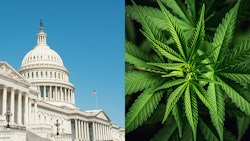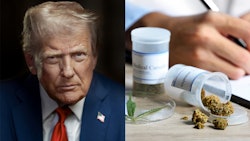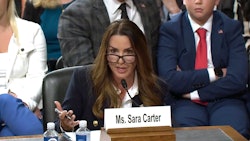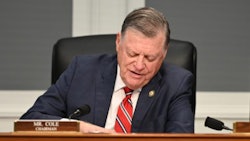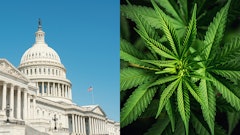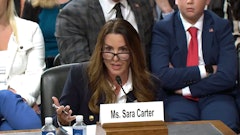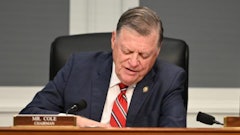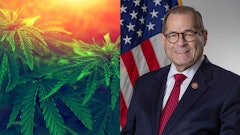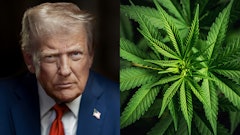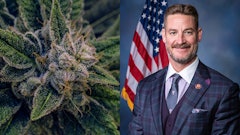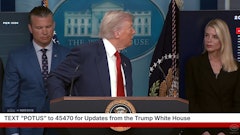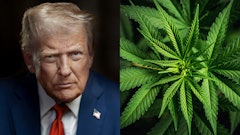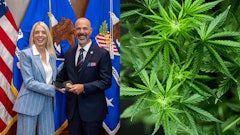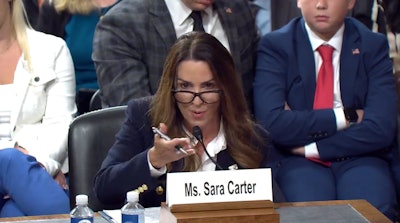
President Donald Trump’s nominee to be the White House’s top drug policy adviser avoided providing her position on cannabis rescheduling and medical cannabis legalization when pressed by a pair of U.S. senators.
Sara Carter, the president’s pick to be the director of the White House Office of National Drug Control Policy (ONDCP), merely said she would “comply with all federal laws and fulfill all statutory responsibilities” if confirmed.
These answers, published this week, were responses to written questions for the record (QFR) from Senate Judiciary Committee members in a follow-up to her nomination hearing before the committee on Sept. 17.
“On an episode of your podcast, ‘The Sara Carter Show,’ you stated that you supported the legalization of medical marijuana,” Sen. Dick Durbin, D-Ill., wrote in his QFR. “Specifically, you said, ‘cannabis for medicinal purposes and medical reasons is a fantastic way’ of managing cancer, other illnesses, and related side effects. If confirmed as ONDCP director, will you work to legalize medical marijuana on the federal level?”
Durbin, who serves as the Senate Democratic Whip, was referring to Carter’s November 2023 podcast, when she said she doesn’t “have any problem” with cannabis being legalized and monitored.
“If confirmed as director, I will comply with all federal laws and fulfil all statutory responsibilities of the ONDCP,” Carter wrote in her response to Durbin. “I will also work with the interagency to ensure an examination of all facts and evidence as part of any scheduling or policy actions.”
Durbin also asked her if she supports the rescheduling of cannabis. She repeated her previous answer.
Sen. Cory Booker, D-N.J., also asked Carter about the rescheduling proposal that was initiated under President Joe Biden’s administration, with former Attorney General Merrick Garland signing a proposed rule to reclassify cannabis from a Schedule I to Schedule III drug under the Controlled Substances Act.
“As you are aware, under the Controlled Substances Act (CSA), the rescheduling process begins when the Department of Health and Human Services (HHS) conducts a scientific evaluation and makes a recommendation to the Drug Enforcement Administration (DEA),” Booker wrote in his QFR. “Throughout the existence of the CSA’s rescheduling process, DEA has never rejected a recommendation by HHS to reschedule a substance.
“Who do you believe is better suited to conduct the scientific and medical evaluations of drugs: prosecutors or scientists and doctors?”
Carter repeated her previous response in answering Booker.
“As stated at the hearing, if confirmed, I will work with all relevant interagency stakeholders to ensure an examination of all facts and evidence,” she wrote. “Under the CSA, scientists and doctors use a comprehensive approach in balancing potential risks and benefits of any substance, and the HHS secretary provides a recommendation to the attorney general.”
After conducting its scientific and medical evaluation under Biden, the HHS determined in August 2023 that cannabis has low abuse potential and has currently accepted medical use in the U.S., recommending that it be reclassified as a Schedule III substance. While Garland endorsed this recommendation, the DEA, under former Administrator Anne Milgram, never did.
The current rescheduling process has been stayed for the past nine months by an interlocutory appeal granted by a now-retired DEA administrative law judge, whom Milgram tasked with overseeing a fair and transparent hearing process for proponents and opponents to debate the merits of the proposed rule. A pair of cannabis rescheduling proponents requested the interlocutory appeal, in part, because of the DEA’s “hostility” toward the proposed rule.
Under Trump’s DEA administrator, Terry Cole, who was sworn in on July 23, the agency still hasn’t made progress to resume the hearing process: DEA attorneys submitted their third 90-day update on Oct. 6 to say that no briefing schedule has been set to address the interlocutory appeal. In other words, no progress has been made for nine months.
This lack of progress comes despite Cole testifying during his nomination hearing in April that reviewing where the DEA is in the administrative process to reschedule cannabis would be “one of my first priorities.”
As Cole has yet to make good on that promise, Booker pressed Carter further in his QFR.
“If you are confirmed, would you assign more weight to a scheduling recommendation from HHS based on its scientific and medical evaluation of a drug rather than DEA’s opinion?” Booker asked.
“As stated at the hearing, I support the process under the CSA, and if confirmed, I will work with all relevant interagency stakeholders to ensure an examination of all facts and evidence,” Carter wrote in response.
Carter’s vague responses were expected. While she has let her opinions on cannabis shine loudly in the past as a former Fox News contributor, federal restrictions prevent the ONDCP from supporting the legalization of Schedule I substances ahead of U.S. Food and Drug Administration approval. These restrictions also prevent the ONDCP from financing or sponsoring research related to medical or adult-use cannabis under its current control status.
While U.S. House Reps. Dina Titus, D-Nev., and Ilhan Omar, D-Minn., introduced the Evidence-Based Drug Policy Act of 2025 in April to remove these restrictions, Carter, if confirmed, will be unable to speak freely on cannabis reform until this legislation or another legislative fix is implemented.
In addition, Carter, Cole and Attorney General Pam Bondi have yet to provide the American people with any clarity on which direction the cannabis rescheduling question will unfold in the absence of a decision from up top.
Trump told the nation in an Aug. 11 White House press briefing that his administration would determine whether to reschedule cannabis from a Schedule I to Schedule III substance “over the next few weeks.” Two months later, that timeline has come and gone.
Leading up to his election, Trump signaled in September 2024 that he would support cannabis rescheduling. However, during his August 2025 press briefing, the president offered mixed signals.
“Some people like it. Some people hate it,” Trump said. “Some people hate the whole concept of marijuana because it does bad for the children; it does bad for people that are older than children. But we’re looking at reclassification, and we’ll make a determination over the next, I would say, over the next few weeks, and that determination hopefully will be the right one.”










